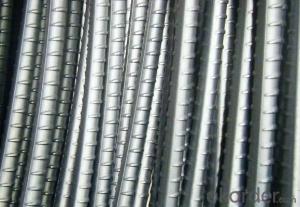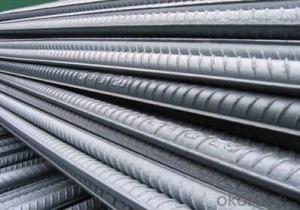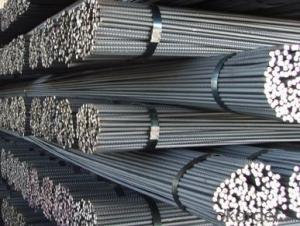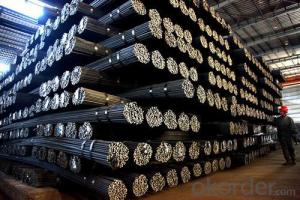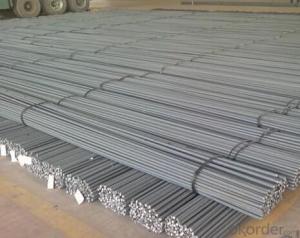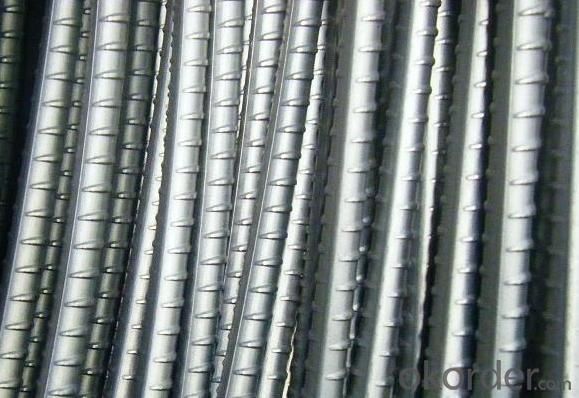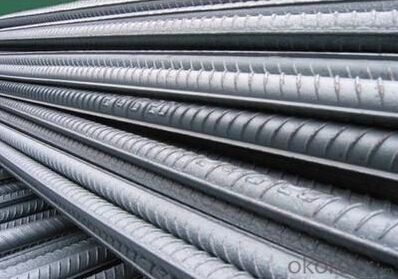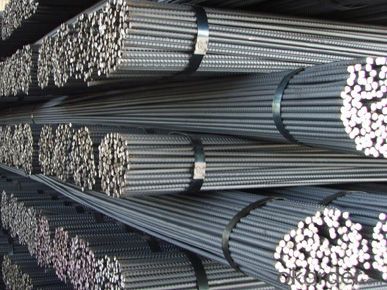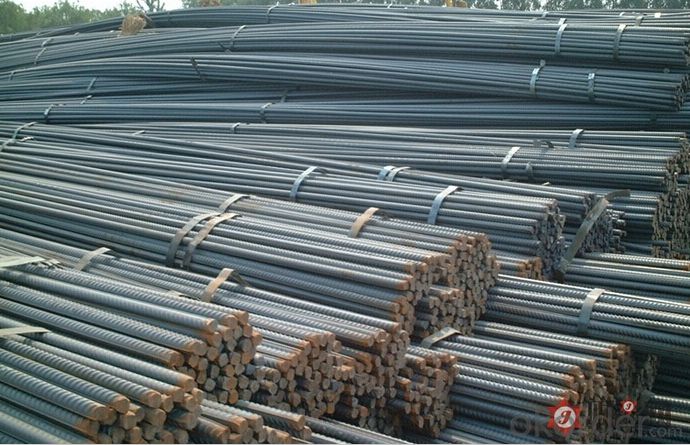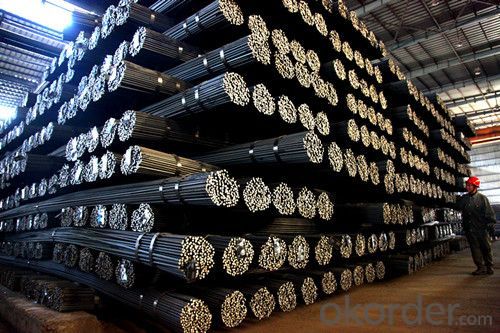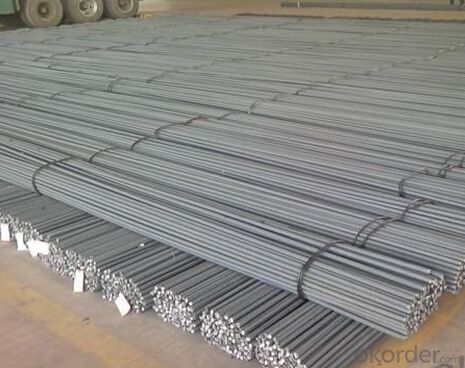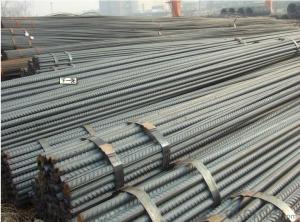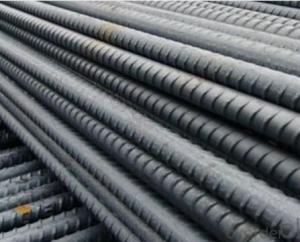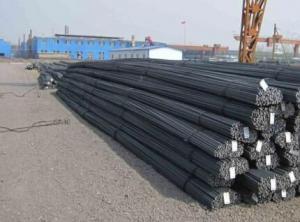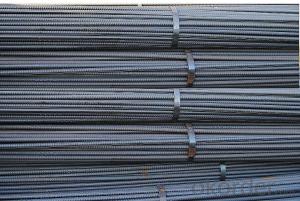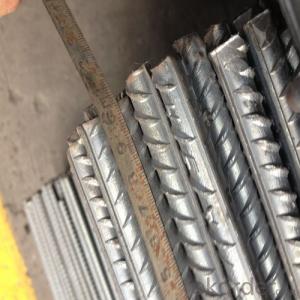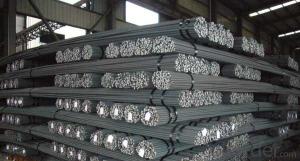High Yield Deformed Bar Grade ASTM A615 & A615M
- Loading Port:
- Tianjin
- Payment Terms:
- TT or LC
- Min Order Qty:
- 50 m.t.
- Supply Capability:
- 10000 m.t./month
OKorder Service Pledge
OKorder Financial Service
You Might Also Like
Specification
High Yield Deformed Bar Grade ASTM A615 & A615M-04a
Details of High Yield Deformed Bar Grade ASTM A615 & A615M-04a
Name | Deformed Bar |
Shape | Round Bar |
Standard | 1.GB1499.2-2007, HRB335, HRB400E 2. ASTM A615 Gr.40, Gr.60 3.BS4449/1997 |
Diameter | 6mm-50mm |
Length | 6m, 8m, 9m,12m as standard or as request |
Test | SGS/UT 100% Elements Testing |
Certificate: | ISO/Mill Certificate |
Service: | 24 hours online service / |
more than 20 years trading and manufacture | |
Quality Assurance: | the third party inspection, such as SGS, BV, TUV…etc. is acceptable |
Packaging Details: | Seaworthy Packaging or as per customer's packing instruction |
Specification of High Yield Deformed Bar Grade ASTM A615 & A615M-04a
Standard | Grade | Yield Strength Mpa | Tensile Strength | Elongation% |
BS4449:1997 | 250 | 250 | 295 | 22 |
460A | 460 | 485 | 12 | |
460B | 460 | 500 | 15 | |
GB1499.2-2007 | HRB335/335E | 335 | 455 | 17 |
HRB400/400E | 400 | 540 | 17 | |
HRB500/500E | 500 | 630 | 16 | |
ASTM A615 & A615M-04a | GRADE40 | 280 | 420 | 12 |
GRADE60 | 420 | 620 | 9 | |
GRADE75 | 520 | 690 | 7 | |
JIS G3112-2004 | SD295A | ≥ 295 | 440-600 | 17 |
SD295B | 295-390 | ≥ 440 | 17 | |
SD345 | 345-440 | ≥490 | 19 | |
SD390 | 390-510 | 560 | 17 | |
SD490 | 490-625 | ≥ 620 | 13 |
Size | WEIGHT | WEIGHT | QUANTITY | ||
LENGTH 6M | LENGTH 12M | LENGTH 6M | LENGTH 12M | ||
6 | 0.222 | 1.332 | 2.664 | 751 | 375 |
8 | 0.395 | 2.37 | 4.74 | 422 | 211 |
10 | 0.617 | 3.702 | 7.404 | 270 | 135 |
12 | 0.888 | 5.328 | 10.656 | 188 | 94 |
14 | 1.21 | 7.26 | 14.52 | 138 | 69 |
16 | 1.58 | 9.48 | 18.96 | 106 | 53 |
18 | 2 | 12 | 24 | 83 | 42 |
20 | 2.47 | 14.82 | 29.64 | 67 | 34 |
22 | 2.98 | 17.88 | 35.76 | 56 | 28 |
25 | 3.85 | 23.1 | 46.2 | 43 | 22 |
28 | 4.83 | 28.98 | 57.96 | 35 | 17 |
32 | 6.31 | 37.86 | 75.72 | 26 | 13 |
36 | 7.99 | 47.94 | 95.88 | 21 | 10 |
40 | 9.87 | 59.22 | 118.44 | 17 | 8 |
50 | 15.42 | 92.52 | 185.04 | 11 | 5 |
CNBM Introduction of High Yield Deformed Bar Grade ASTM A615 & A615M-04a Supplier
CNBM International Corporation is the most import and export platform of CNBM group(China National Building Material Group Corporation) ,which is a state-owned enterprise, ranked in 270th of Fortune Global 500 in 2015.
With its advantages, CNBM International are mainly concentrate on Cement, Glass, Iron and Steel, Ceramics industries and devotes herself for supplying high quality series of refractories as well as technical consultancies and logistics solution.
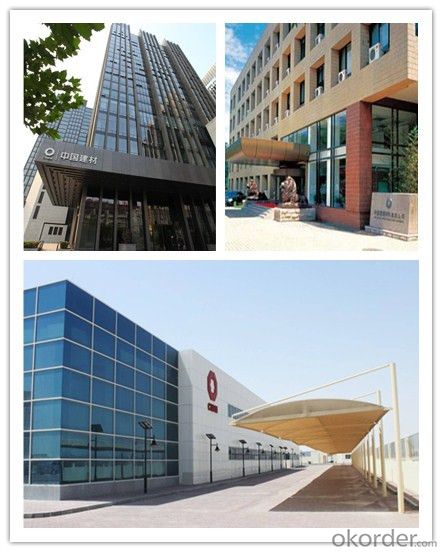
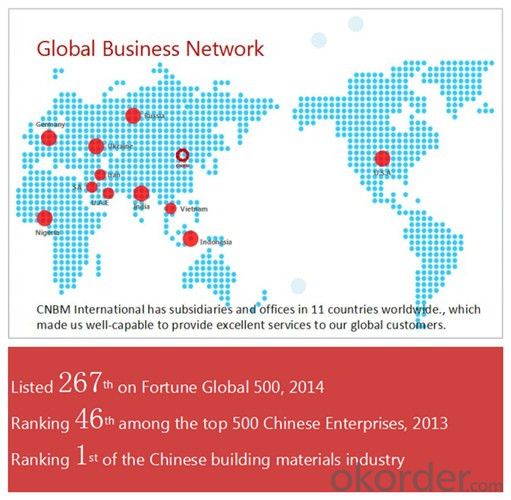
Packaging & Delivery of High Yield Deformed Bar Grade ASTM A615 & A615M-04a
Packaging Detail | Sea worthy packing /as per customer's packing instruction |
Delivery Detail | 15 ~ 40 days after receiving the deposit |
Products Show
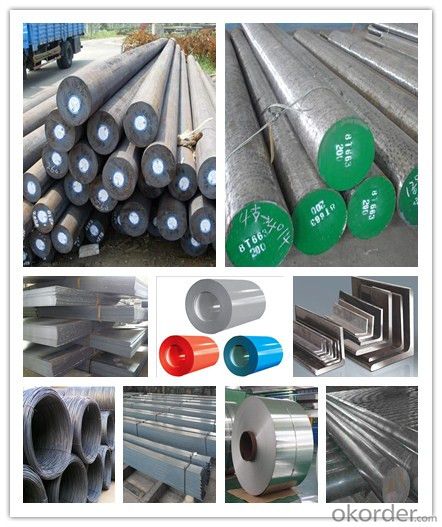
FAQ:
Are you a trading company or manufacturer? | Manufacturer |
What’s the MOQ? | 3 metric ton |
What’s your delivery time? | 15-35 days after downpayment received |
Do you Accept OEM service? | Yes |
what’s your delivery terms? | FOB/CFR/CIF |
What's the Payment Terms? | 30% as deposit,70% before shipment by T/T |
Western Union acceptable for small amount. | |
L/C acceptable for large amount. | |
Scrow ,Paybal,Alipay are also ok | |
Why choose us? | Chose happens because of quality, then price, We can give you both. Additionally, we can also offer professional products inquiry, products knowledge train (for agents), smooth goods delivery, excellent customer solution proposals. |
What's your available port of Shipment? | Main Port, China |
What’s your featured services? | Our service formula: good quality+ good price+ good service=customer's trust
|
Where are your Market? | Covering more than 160 countries in the world |
- Q: How does special steel contribute to the mining equipment industry?
- Special steel plays a crucial role in the mining equipment industry by providing enhanced durability, strength, and resistance to wear and corrosion. The mining sector relies heavily on robust and reliable equipment, as it operates in challenging and harsh environments. Special steel, which is specifically designed to withstand extreme conditions, helps to improve the overall performance and longevity of mining equipment. One of the main advantages of special steel in the mining industry is its exceptional strength. Mining equipment is subjected to intense forces, such as crushing, impact, and abrasion, which can quickly degrade conventional materials. Special steel, on the other hand, offers superior strength properties, allowing mining equipment to withstand heavy loads and resist deformation or breakage. Furthermore, special steel provides excellent resistance to wear and corrosion, which are common challenges in mining operations. The abrasive nature of rocks and minerals can quickly wear down regular steel, reducing the lifespan of equipment and increasing maintenance costs. Special steel, with its higher hardness and wear resistance, helps to minimize the impact of abrasive materials, prolonging the life of mining equipment and reducing downtime. Corrosion is another prevalent issue in the mining industry, as equipment is often exposed to moisture, chemicals, and harsh environments. Special steel is specifically formulated to resist corrosion, ensuring that mining equipment remains structurally sound and functional even in corrosive conditions. This resistance to corrosion improves the overall safety and reliability of mining operations. Moreover, special steel offers flexibility in terms of design and customization, allowing manufacturers to develop mining equipment tailored to specific needs. By utilizing different grades of special steel, manufacturers can optimize the properties of mining equipment, enabling it to meet the unique requirements of different mining applications. In conclusion, special steel significantly contributes to the mining equipment industry by providing enhanced strength, durability, wear resistance, and corrosion resistance. The utilization of special steel in mining equipment helps to improve performance, extend equipment lifespan, reduce maintenance costs, and enhance safety in mining operations.
- Q: How does special steel perform in terms of creep resistance at elevated temperatures?
- Special steel is known for its excellent performance in terms of creep resistance at elevated temperatures. Creep refers to the gradual deformation of a material under constant stress at high temperatures over an extended period. Special steel, specifically designed to withstand high temperatures, demonstrates a remarkable ability to resist creep and maintain its structural integrity. The unique composition of special steel, which includes various alloying elements such as chromium, molybdenum, and vanadium, contributes to its exceptional creep resistance. These alloying elements enhance the steel's high-temperature strength, increase its resistance to deformation, and inhibit the formation of detrimental microstructural changes that can occur during creep. Furthermore, special steel undergoes specific heat treatment processes, such as quenching and tempering, which further enhance its creep resistance. These processes help refine the steel's microstructure, resulting in a fine-grained and homogenous material that can resist deformation even under prolonged exposure to high temperatures. The superior creep resistance of special steel makes it a preferred choice in various industries that operate under high-temperature conditions, such as power generation, petrochemical, and aerospace. It allows for extended service life, reduced maintenance, and increased safety in critical applications where failure due to creep deformation could have severe consequences. In summary, special steel exhibits exceptional performance in terms of creep resistance at elevated temperatures. Its unique composition, including alloying elements and specific heat treatment processes, enables it to resist deformation and maintain its structural integrity even under prolonged exposure to high temperatures.
- Q: What are the limitations of special steel in certain applications?
- Special steel, although highly versatile and durable, does have certain limitations in certain applications. One limitation of special steel is its high cost. Special steel is typically more expensive to produce compared to regular steel due to the addition of various alloying elements. This can make it less economically viable for certain applications where cost is a significant factor, especially in large-scale projects or industries with tight budgets. Another limitation is its susceptibility to corrosion. While special steel is generally more resistant to corrosion compared to regular steel, it is still not completely immune to the effects of corrosion. In environments with high levels of moisture, chemicals, or extreme temperatures, special steel may still corrode over time if not properly protected or maintained. Special steel also has limitations in terms of formability and workability. Due to its higher strength and hardness, special steel can be more challenging to shape, bend, or weld compared to regular steel. This can limit its use in applications that require complex or intricate designs, as well as those that involve extensive fabrication or assembly processes. Furthermore, special steel may have certain limitations in terms of availability and supply chain. Not all types of special steel may be readily available in the market, especially in remote or less developed regions. This can make it difficult to source the required special steel for specific applications, leading to potential delays or compromises in project execution. Lastly, the specialized properties of special steel may not always be necessary or advantageous for certain applications. In some cases, regular steel or alternative materials may be more suitable and cost-effective, especially if the specific properties of special steel are not required for the intended use. Overall, while special steel offers numerous benefits and advantages, it is important to consider its limitations in certain applications. Careful evaluation of the specific requirements, cost-effectiveness, and availability of special steel is essential to ensure its successful and optimal use in any given situation.
- Q: How does special steel contribute to improving product quality?
- Special steel contributes to improving product quality in several ways. Firstly, special steel is known for its superior strength, durability, and resistance to corrosion, making it ideal for manufacturing high-quality products that can withstand challenging conditions and last longer. Secondly, special steel often has unique properties like high heat resistance, excellent machinability, or specific magnetic properties, which enable manufacturers to create products with enhanced performance and functionality. Moreover, special steel allows for precise and intricate designs, enabling the production of complex components with tight tolerances, resulting in improved accuracy and efficiency. Overall, the use of special steel in manufacturing processes helps to ensure that the final products are of higher quality, more reliable, and better suited to meet the needs and expectations of customers.
- Q: What are the different nitriding techniques used for special steel?
- There are several nitriding techniques used for special steel, including gas nitriding, salt bath nitriding, plasma nitriding, and ion nitriding. Each technique involves introducing nitrogen into the surface of the steel to improve its hardness, wear resistance, and corrosion resistance. Gas nitriding involves exposing the steel to ammonia gas at high temperatures, while salt bath nitriding immerses the steel in a bath of molten salts containing nitrogen. Plasma nitriding and ion nitriding both use electrical discharges to ionize nitrogen gas and accelerate it towards the steel surface. These techniques offer different levels of control over the nitriding process and can be tailored to meet specific requirements for different types of special steel applications.
- Q: What are the main industries that use special steel?
- Special steel is widely used in several industries due to its unique properties and characteristics. Some of the main industries that heavily rely on special steel include: 1. Automotive Industry: Special steel is extensively used in the manufacturing of various automotive components such as engine parts, transmission gears, suspension systems, and exhaust systems. Its high strength, durability, and resistance to wear and corrosion make it ideal for these applications. 2. Aerospace Industry: Special steel is crucial for the aerospace industry as it is used in the production of aircraft components including turbine blades, landing gears, and structural parts. The high temperature resistance, strength, and lightweight properties of special steel are vital for ensuring the safety and efficiency of aerospace systems. 3. Energy and Power Generation: Special steel finds applications in the energy sector, particularly in power plants and nuclear facilities. It is used for the construction of turbines, generators, and heat exchangers, where its high temperature resistance and exceptional strength are vital for efficient energy production. 4. Oil and Gas Industry: Special steel is extensively used in the oil and gas sector for drilling equipment, pipelines, valves, and other components. The corrosion resistance, high strength, and ability to withstand extreme conditions make special steel a preferred choice in this industry. 5. Construction and Infrastructure: Special steel is utilized in the construction industry for various purposes such as building structures, bridges, and high-rise buildings. Its high tensile strength, durability, and resistance to impact and corrosion ensure the integrity and longevity of these structures. 6. Tool and Die Making: Special steel is widely used in the manufacturing of tools and dies for various industrial processes. Its hardness, toughness, and wear resistance make it ideal for applications such as cutting, drilling, and shaping metals. 7. Defense and Military: Special steel plays a crucial role in the defense and military sector, where it is used for the production of armored vehicles, weapons, and other military equipment. Its ability to withstand high impacts, resist ballistic penetration, and maintain structural integrity under extreme conditions is vital for ensuring the safety and effectiveness of military operations. In summary, the main industries that heavily rely on special steel include automotive, aerospace, energy and power generation, oil and gas, construction and infrastructure, tool and die making, and defense and military. These industries benefit from the unique properties of special steel, such as high strength, durability, resistance to wear and corrosion, and the ability to withstand extreme conditions.
- Q: Can special steel be used in the production of fasteners for high-stress applications?
- Yes, special steel can be used in the production of fasteners for high-stress applications. Special steels like alloy steel or stainless steel possess enhanced strength, durability, and resistance to corrosion, making them suitable for withstanding high-stress environments. These fasteners provide reliable and secure connections even under extreme conditions, ensuring the safety and performance of the application.
- Q: What are the different casting methods used for special steel?
- There are several different casting methods used for special steel, including sand casting, investment casting, continuous casting, and centrifugal casting. Each method has its own advantages and is suited for specific applications. Sand casting is a common and cost-effective method that involves pouring molten steel into a sand mold. Investment casting, on the other hand, uses a wax pattern that is coated in a ceramic shell and then melted away to leave a cavity for the steel to be poured into. Continuous casting is a continuous process where molten steel is poured into a water-cooled mold and solidifies into a continuous strand. Finally, centrifugal casting involves spinning a mold while pouring the molten steel, creating a centrifugal force that helps distribute the metal evenly. These different methods allow for the production of special steel components with various sizes, shapes, and properties.
- Q: How does special steel perform in heat treatment applications?
- Special steel is specifically designed to perform well in heat treatment applications. Unlike regular steel, special steel has been alloyed with specific elements to enhance its heat resistance and improve its mechanical properties. When subjected to heat treatment processes such as annealing, quenching, tempering, or hardening, special steel undergoes structural changes that result in improved strength, hardness, toughness, and wear resistance. The performance of special steel in heat treatment applications can be attributed to its unique alloying elements, such as chromium, molybdenum, nickel, and vanadium. These elements form various carbides, nitrides, or intermetallic compounds during heat treatment, which contribute to the overall improvement in the steel's properties. For example, chromium forms chromium carbides that increase hardness and corrosion resistance, while molybdenum and vanadium promote hardenability and wear resistance. Moreover, special steel exhibits excellent dimensional stability during heat treatment. It has a low tendency to warp or distort, ensuring that the final product maintains its desired shape and dimensions. This dimensional stability is particularly crucial for applications that require tight tolerances or intricate designs. Additionally, special steel offers consistent and reliable heat treatment results. Its composition and microstructure are carefully controlled, ensuring that it responds predictably to heat treatment processes. This allows manufacturers to achieve the desired mechanical properties consistently, reducing the risk of inconsistencies or failures in the final product. In summary, special steel performs exceptionally well in heat treatment applications. Its unique alloying elements, dimensional stability, and consistent heat treatment response make it an ideal choice for applications that require improved strength, hardness, toughness, and wear resistance. Whether it is for automotive components, tooling, or industrial machinery, special steel delivers reliable and enhanced performance after undergoing heat treatment processes.
- Q: What are the different applications of stainless special steel?
- Stainless special steel finds various applications in industries like construction, automotive, aerospace, and medical. It is commonly used in the production of surgical instruments, chemical processing equipment, heat exchangers, and food processing machinery. Its corrosion resistance, strength, and ability to withstand high temperatures make it an ideal choice for applications where durability and hygiene are essential.
Send your message to us
High Yield Deformed Bar Grade ASTM A615 & A615M
- Loading Port:
- Tianjin
- Payment Terms:
- TT or LC
- Min Order Qty:
- 50 m.t.
- Supply Capability:
- 10000 m.t./month
OKorder Service Pledge
OKorder Financial Service
Similar products
Hot products
Hot Searches
Related keywords
